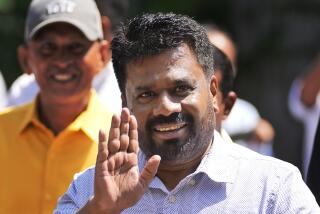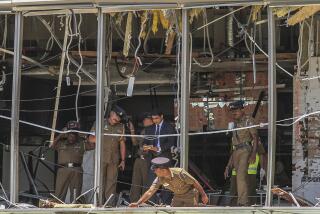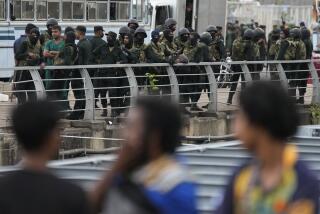Starting Over in Sri Lanka
- Share via
Despite decades of ethnic terrorism, Sri Lanka has managed to remain a democracy, a beacon to other South Asian nations trying to advance from dictatorship to representative government. Attacks on police, soldiers and civilians have rocked its foundations, but the December tsunami that devastated Sri Lanka offered the hope of forging at least a temporary unity between the government and rebel terrorists. The hope was in vain.
The Liberation Tigers of Tamil Eelam, pioneers of suicide bombings, assassins of former Indian Prime Minister Rajiv Gandhi and also fighters for independence in their territory of the island nation, complained they were being cut out of much of the $3 billion in foreign aid following the tsunami. The government denies any shortchanging.
Areas controlled by Sinhalese, the majority community, and Tamils both suffered. More than 30,000 Sri Lankans are thought to have been killed, an enormous toll but less than half the number slain in more than 20 years of fighting between Tamil rebels and the government.
Three years ago, Norway, home to Tamil fundraisers and thus trusted by the rebels, persuaded both sides to agree to a cease-fire (largely successful, though security forces blame the Tamil Tigers in Wednesday’s shooting of two police officers). Last month, mediators brokered an agreement on sharing international aid. Opponents in the government argued it would let terrorists consolidate control of important areas and endanger Sri Lanka’s national security.
Those fears are valid. But the government is running out of options. The Tigers’ latest demand is government protection as they distribute aid in areas they control. In return, the rebels should resume talks with the government, mediated by the Norwegians if necessary, for a permanent cease-fire.
More to Read
Sign up for Essential California
The most important California stories and recommendations in your inbox every morning.
You may occasionally receive promotional content from the Los Angeles Times.










